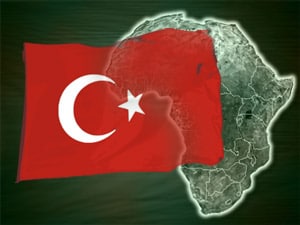
By Bairma Kihoro
People have always been crossing borders. Not just geographical, but social, cultural and psychological ones as well. Everyone has their own dramas, romances, adventures or even horrors in life.
My Tanzanian friend Masumbuko, who has found this land along the Bosporus to be just as attractive as I have, has provided me with some details of his own experience coming to Istanbul, an experience that has been shared by many — and that I would like to share with you.
Like other foreigners in Turkey, those from the African continent have been leaving their homes to come here for all kinds of reasons: political, economic, environmental, personal, etc. We humans all have many things in common; we are driven by our emotions and are inspired by the stories of others.
Many Nigerian, Tanzanian, Ghanaian and Gambian men started arriving in Istanbul in the early ’90s. Years later, others from the continent started coming to Turkey. Among them were Guineans, Senegalese, Sudanese, Ethiopians, Somalis and many others. Some entered the huge megalopolis that is Istanbul, with its multi-level, big-city spirit. Some even came by bus via Syria. Some of them came here as international students on scholarship or as “free birds” — all driven by the attractive and successful stories of the West.
For many Africans, just as for other foreigners, Istanbul in 1992 meant crowded streets, another language, other foods, other smells … other looks. Masumbuko Miraji, a 44-year-old Istanbul expat from Tanzania who came to Turkey in the winter of 1992, explained: “It was cold. After our arrival we went to Sirkeci PTT [the post office] to catch up with our people, because they told us in a letter that they definitely would be there. That was the place where Africans picked up their letters and money from family and friends in those years. So, the PTT was a meeting and collecting point. There was no cell phone, no Western Union, no banking.”
I have always been amazed at how people can unite and live together peacefully under certain conditions. An African abroad is never alone; though they might all be from different nations, they are all supportive of one another, and somehow, sooner or later, they connect with each other. Here in Istanbul, they can survive in a student dorm or a ghetto. Masumbuko remembers: “We used to stay in Kocamustafapaşa on the ground floor of a 1+1 flat with seven people, two couches, mattresses, tables, chairs, a TV set. We shared the bills, contributed money for food, cooked, ate and lived all together.”
Oftentimes, Istanbul was not supposed to be the final destination. For many African immigrants to the city, there is difficulty in finding employment. There are complicated work conditions — low payments, empty promises, psychological pressure, unnecessary looks, words, shoves, actions, no means for motivation, a lack of a cultured staff. Masumbuko says: “I would like to give some advice to our Africans fellows who are newly arriving in Turkey. Turkey is not a place for work; it is a place for making business.”
Another aspect of the non-friendly working environment here had to do with being “the other.” Racism is present, but it has different forms. I heard several times from my Tanzanian friends:“Turkish people don’t attack black people, but they do often talk about us badly. Usually, we encounter verbal abuse, but not physical.” If you are lucky, handsome dude, they say, you are welcome anywhere. Beauty matters, even here.
Powerful feelings.
It’s amazing how easy it is to feel at home if you love someone abroad. Love, as the desire to be in comfort and peace, doesn’t know borders. Africans have been getting married with Turkish people or other foreigners here in Turkey, like me, for years. The ship of love brings people to different waters. Some find a peaceful and decent life; some continue to balance between poverty and getting by.
Sooner or later, the visas of those “free birds” expire. Masumbuko remembers: “We were arrested and brought to jail without any explanation or record.”
Masumbuko had quite a tough time getting to his current place, but he never regrets anything — another touch of the African nature — do not regret, do not harm. He truly loves, understands and knows Turkish culture. He listens to Turkish news and knows who all the significant figures of the country are. Now, Masumbuko is a businessman, running his own company in Dar es Salaam. Turkish textiles and construction materials have found consumers in East Africa. Masumbuko, his team and Turkish partners organize their goods and send them home. Many invest in homes on the African continent. Since 2002, Laleli, Aksaray, Merter and Osmanbey have been home to flowing rivers of African cash.
Official African-Turkish relations have risen like never before, and nobody knows much about it — only those who are involved do. Some business projects enter African land under the umbrella of educational and religious projects. Some are there because of personal connections or the support of nonprofit organizations.
There are many Africans in Turkey now. Here they have their homes, their projects, their new families and multicultural kids. They have their own competition and networks, their own leaders and contributors. Now, in 2014, there are over 50,000. Daily, men and women from the African continent arrive in and depart from Turkey, this marvelous land between the East and West.










